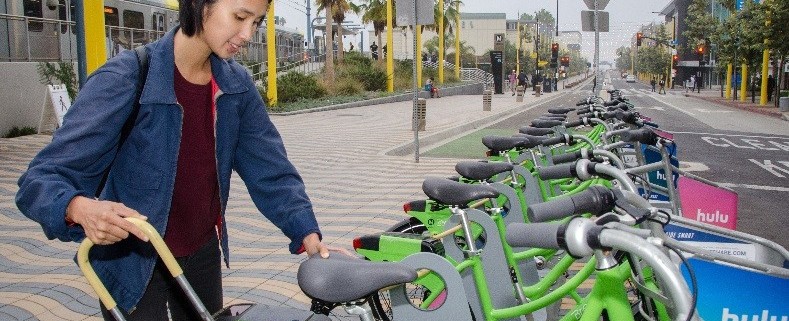CALBIKE Opposes AB 371
DATE: updated 3/02/2022 [edited from original 2/22/22]
CONTACT: Dave Snyder, CalBike, 916-251-9433, dave@calbike.org
CALBIKE Opposes AB 371 – Save Bike-Share!
Sacramento – The California Bicycle Coalition (CalBike) opposes AB 371 by Assembly Member Jones-Sawyer. This bill would impose an unprecedented cost on bike share and scooter share systems by forcing the provider to carry insurance to pay for damage caused by the user. It would put most, if not all, shared micromobility systems out of business, and make it fiscally impossible to subsidize an expansion of the system so that it serves everyone equitably, and not just the privileged residents in wealthy downtowns. CalBike helped defeat a similar provision in the 2020 legislature.
Eliminating shared micromobility programs would be a disaster for California’s climate. They provide affordable transportation and help to reduce vehicle miles traveled by providing an alternative to the car for short trips. Bike and scooter sharing systems also extend the reach of existing transit systems by giving riders a way to get from a transit station to a destination that is out of walking distance.
“We’ve only begun to see the potential of low-cost shared bikes and scooters to enhance public transit and provide low-impact, safe mobility for people who can’t afford cars or who prefer not to drive,” said Dave Snyder, CalBike’s Executive Director. “We should be expanding bike-share, not killing it.”
The bill is currently in the Senate Insurance Committee.
AB 371 imposes an unprecedented insurance burden on shared mobility systems
AB 371 would require micromobility operators (public and private) to acquire insurance that covers negligent conduct of a device rider. This requirement would be a legal anomaly. Rental car companies are not liable for the negligence of their drivers. Basketball court owners aren’t required to carry insurance for injuries caused if a fight breaks out among players. Roller skate shops don’t have to pay for insurance to cover the costs of someone injured by one of their skating customers.
Comparing this proposal to existing requirements for motor vehicles is instructive. Motorists must carry $30,000 in insurance for their own liability. If AB 371 passes, bike- and scooter-share operators would be required to carry $500,000 in insurance for injuries caused through no fault of their own. That disparity is hard to justify when you compare the difference in weight and speed of bikes and scooters compared to motor vehicles.
Pedestrian Safety, Social Equity, and our Climate, are Threatened
Bike share systems have the potential to serve low-income communities with high-quality transportation that is as affordable as public transit but healthier, usually faster, and sometimes even fun. This vision will require the massive deployment of bikes and e-bikes and scooters, substantial subsidy to make it affordable, and the development of safe bikeways. It’s part of a future with much fewer cars, and therefore a safer future, without most of the 15,000 serious pedestrian injuries caused by cars in California last year. This future is not only possible, it’s required if we are to meet our climate goals. In 2021, the Air Resources Board recognized the importance of bike and scooter share systems for low-income people by granting millions of dollars in its Clean Mobility Options program to bike-sharing. This measure would end the programs funded by state grants, putting California at odds with itself. Cities like San Francisco that are considering expanding bike share operations by taking a more active role would have to scuttle those plans.
CalBike urges the legislature to stop AB 371 and save bike-share.





